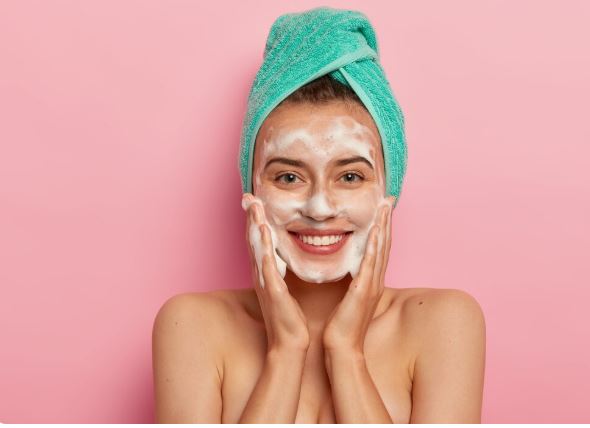Taking care of your skin is an important part of daily hygiene. For many people, having clear, bright, and even skin tone is a goal. One popular product that helps with this is whitening facewash. This type of facewash is made to clean your skin while also working to reduce dark spots and improve overall brightness.
In this article, we will explore what whitening facewash is, how it works, what ingredients to look for, and how to use it correctly for the best results. We will also talk about the benefits, possible side effects, and tips to choose the right product for your skin type.
What is Whitening Facewash?
Whitening facewash is a skincare product designed to remove dirt, oil, and impurities from the face while helping to lighten skin tone over time. It is usually used as part of a daily skincare routine. Unlike harsh chemical products, many whitening facewashes are made with gentle ingredients that focus on brightening the skin in a natural way.
How Whitening Facewash Works
The main function of any facewash is to clean the skin. A whitening facewash does this while also including ingredients that help to reduce the appearance of dark spots, acne scars, sun damage, and uneven skin tone. It usually contains lightening agents that slow down the production of melanin, the pigment responsible for darkening the skin.
Most whitening facewashes are mild and safe for everyday use. When used regularly, they can give your skin a clearer, more glowing appearance.
Key Ingredients in Whitening Facewash
Some common ingredients found in whitening facewashes include:
-
Vitamin C: Known for its skin-brightening properties.
-
Licorice Extract: Helps in reducing pigmentation.
-
Niacinamide: A form of Vitamin B3 that improves skin tone.
-
Arbutin: A natural skin lightener.
-
Kojic Acid: Reduces melanin production.
-
Aloe Vera: Soothes and hydrates the skin.
It’s important to read the label and understand what each ingredient does. If you have sensitive skin, go for facewashes with natural or mild ingredients.
Benefits of Using Whitening Facewash
There are several benefits to using a whitening facewash as part of your daily skincare routine:
-
Cleans the Skin: Removes oil, dirt, and sweat, which can clog pores.
-
Improves Skin Tone: Helps reduce dark spots, giving the skin a more even tone.
-
Reduces Pigmentation: Fades scars and discoloration caused by sun or acne.
-
Boosts Glow: Brightens the face naturally, making the skin look fresh.
-
Prepares Skin for Other Products: Clean skin absorbs creams and serums better.
How to Use Whitening Facewash Correctly
To get the most out of your whitening facewash, follow these steps:
-
Wet Your Face: Use lukewarm water to rinse your face. This helps open up the pores.
-
Apply the Facewash: Take a small amount and gently massage it onto your skin in circular motions.
-
Rinse Thoroughly: Wash off with clean water. Make sure no residue is left.
-
Pat Dry: Use a clean towel to gently dry your face.
-
Follow with a Moisturizer: This keeps your skin hydrated and balanced.
Use the facewash once or twice daily for best results. Avoid using it too often as over-washing can dry out the skin.
Who Can Use Whitening Facewash?
Whitening facewash is suitable for most skin types, including oily, dry, and combination skin. However, it’s important to choose a product that fits your specific needs. If you have dry skin, look for hydrating ingredients. If you have oily or acne-prone skin, choose one that is oil-free and non-comedogenic.
Possible Side Effects
Although most whitening facewashes are safe, some people may experience mild side effects like:
-
Dryness
-
Irritation
-
Redness
-
Allergic reaction
To avoid this, always do a patch test before trying a new product. If irritation continues, stop using the product and consult a dermatologist.
Tips for Choosing the Right Whitening Facewash
When selecting a whitening facewash, keep the following tips in mind:
-
Know your skin type: Choose a product made for your skin needs.
-
Read the ingredients: Look for natural and effective components.
-
Avoid harsh chemicals: Stay away from products with alcohol or parabens.
-
Check for reviews: Choose trusted brands with positive feedback.
-
Test before full use: Always try a small amount first to check for allergies.
Natural Alternatives to Whitening Facewash
If you prefer natural skincare, you can also try homemade face cleansers using ingredients like:
-
Lemon juice and honey
-
Cucumber and yogurt
-
Milk and turmeric
-
Papaya mash
These natural remedies can help brighten the skin gently, though they may take more time to show results compared to store-bought facewashes.
Conclusion
Whitening facewash can be a great addition to your daily skincare routine if you are looking to improve your skin tone and achieve a fresh, clean look. With the right product and proper use, it can help you achieve brighter, more even skin naturally. Just remember to choose a product that matches your skin type, follow a regular routine, and be patient with the results.









